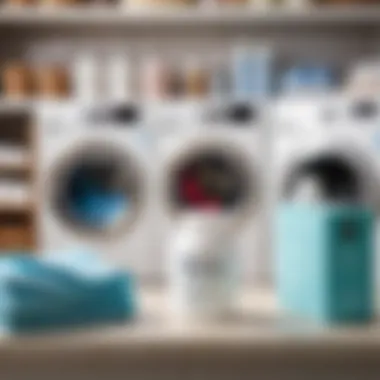Discover the Benefits of Non-Allergenic Fabric Softeners


Intro
In recent years, the conversation surrounding fabric care products has expanded to include a growing concern for sensitive skin. Many individuals experience reactions to traditional fabric softeners, which often contain chemicals that can irritate. This has led to a heightened interest in non-allergenic fabric softeners. These alternatives not only promise a gentle touch on fabrics but also aim to provide safety and comfort for users with sensitivities.
In this guide, we will delve into the characteristics and benefits of non-allergenic fabric softeners. These products differ significantly from their conventional counterparts, primarily in formulation. Understanding these differences is crucial for selecting the right softener for both personal care and maintaining garment quality. Also, we will explore environmental considerations associated with these products, which adds another layer of relevance in today's eco-conscious market.
By the end of this article, readers will be equipped with the knowledge necessary to make informed decisions regarding fabric softeners, ultimately ensuring that their laundry experience is not only pleasant but also safe.
Prologue to Non-Allergenic Fabric Softeners
The role of non-allergenic fabric softeners in modern fabric care cannot be overstated. Many people experience skin sensitivities and allergies, making it necessary to explore fabric care options that are gentle and safe. Using non-allergenic softeners can significantly enhance the experience of washing clothes, particularly for those with delicate skin conditions. They provide the same levels of ease and comfort as traditional versions without the risk of irritation.
Definition and Importance
Non-allergenic fabric softeners are products designed to soften fabrics while minimizing the risk of allergic reactions. These formulations significantly reduce the time clothes may spend in contact with irritating chemicals. Most importantly, they are ideal for individuals who are sensitive to strong fragrances or additives commonly found in standard fabric softeners. Understanding this distinction is crucial for individuals looking to maintain skin health while also enjoying the benefits of softer clothes.
The importance of non-allergenic fabric softeners lies not just in their ability to enhance fabric feel. They also contribute positively to overall laundry outcomes. For families with young children, for example, using non-allergenic products becomes essential in avoiding potential skin issues that could arise from exposures to harsh chemicals. Hence, they provide peace of mind that contributes to a more enjoyable laundry routine.
Brief History of Fabric Softeners
Fabric softeners have undergone significant evolution since their inception. Initially introduced in the 1950s, these products gained popularity largely due to their ability to reduce static cling and softening fabrics during the wash cycle. The traditional formulations often included a range of synthetic chemicals which, while effective, also posed risks for allergy sufferers.
In the time since, there has been a notable shift. The demand for safer, more natural options has prompted manufacturers to develop non-allergenic alternatives. Today, these options leverage safer ingredients without sacrificing effectiveness. This shift in formulation reflects a broader trend towards sustainability and health consciousness in consumer products, making non-allergenic softeners a vital category in textile care.
The evolution from traditional fabric softeners to non-allergenic variants showcases the market's response to consumer needs for safety and sensitivity.
As society becomes increasingly aware of the implications of chemical exposure, the relevance of non-allergenic fabric softeners continues to grow. They represent a conscious choice in a landscape often filled with products that do not consider personal health.
What Makes a Fabric Softener Non-Allergenic?
Understanding what makes a fabric softener non-allergenic is essential for anyone who wants to care for their clothes without compromising skin health. Non-allergenic fabric softeners are designed specifically to reduce the likelihood of allergic reactions in users. This is particularly important for individuals with sensitive skin or allergies, as standard fabric softeners may contain irritating substances. Key elements in the formulation of non-allergenic options ensure a gentle experience, enhancing comfort while maintaining product effectiveness.
Ingredients Commonly Found in Non-Allergenic Softeners
The formulation of non-allergenic fabric softeners often includes ingredients that are less likely to trigger skin sensitivities. Some common substances found in these products include:
- Plant-based surfactants: These are derived from natural sources and are generally milder than synthetic counterparts. They help to soften fabrics effectively.
- Essential oils: Natural essential oils can provide pleasant scents without synthetic fragrances that often cause allergic reactions.
- Preservatives with low irritant potential: Non-allergenic fabric softeners typically use preservatives that are less harsh. This minimizes the risk of reactions while extending the shelf life of the product.
- No dyes or artificial scents: These additives are known allergens and are usually omitted to improve product suitability for sensitive users.
Using softeners with these types of ingredients can lead to an overall safer laundry experience, ultimately promoting skin health.
Comparing Allergenic and Non-Allergenic Formulations


When comparing allergenic and non-allergenic fabric softeners, the distinction often lies in the ingredient list and their function. Here are some key differences:
- Ingredient Composition: Allergenic formulations often contain synthetic fragrances, dyes, or harsh preservatives. Non-allergenic versions prioritize natural alternatives, reducing irritations.
- Potential Side Effects: Allergenic softeners may lead to skin irritation, redness, or respiratory issues. Non-allergenic ones usually do not trigger these symptoms, making them safer for sensitive groups.
- Longevity of Scents: While regular softeners often boast long-lasting fragrances, these are typically achieved through synthetic chemicals, which can provoke allergies. Non-allergenic options maintain a subtle, natural scent without adverse effects.
"Opting for non-allergenic fabric softeners can significantly enhance comfort, especially for individuals with sensitivities."
Understanding these differences informs consumers, guiding them to make educated choices based on their unique needs and conditions.
Benefits of Using Non-Allergenic Fabric Softeners
Non-allergenic fabric softeners play a significant role in enhancing the laundry experience, particularly for individuals with sensitive skin. Traditional fabric softeners often contain harsh chemicals that can lead to irritation and discomfort after clothing is washed. By contrast, non-allergenic alternatives are designed with gentler properties, thereby minimizing adverse reactions. This section delves into the various benefits provided by these softeners, showing how they contribute positively to personal care routines.
Gentle on Sensitive Skin
The primary advantage of non-allergenic fabric softeners lies in their formulation which avoids common irritants. For many individuals, exposure to certain chemicals can cause skin reactions, including rashes or redness. Non-allergenic options utilize safer, milder ingredients that do not provoke such responses. This is especially important for those with conditions like eczema or allergies.
The absence of synthetic fragrances and dyes in these products enhances their safety. This reduction in potentially harmful substances enables those with delicate skin to enjoy soft, fresh-smelling linens without fear of irritation. Additionally, the formulation typically has a lower pH level, making it more compatible with the skin's natural balance.
Enhanced Comfort and Softness
Another essential benefit of non-allergenic fabric softeners is the improved comfort they provide. Clothes treated with these softeners often feel softer against the skin, enhancing the overall wearing experience. The advanced formulation allows fibers to relax and become less rigid, which reduces friction when wearing or using fabrics.
Moreover, non-allergenic fabric softeners help to maintain the original quality of the fabric over time. Cotton, wool, and synthetic blends all gain additional softness without compromising durability. For individuals who value comfort in their daily wear, investing in non-allergenic products can lead to a notable improvement in the textiles' feel.
Reduction of Static Electricity
Static electricity is a common annoyance that many people experience in their laundry. This phenomenon can cause clothes to cling together, creating uncomfortable situations while dressing. Non-allergenic fabric softeners effectively combat this issue by coating the fibers, which helps in reducing static build-up.
When static is minimized, individuals can enjoy a more hassle-free wardrobe. This is particularly relevant in colder seasons or in dry environments when static electricity tends to be more pronounced. The reduction of static not only enhances the practical aspects of clothing but also promotes a better appearance, as clothes remain smoother and wrinkle-free.
Using non-allergenic fabric softeners helps maintain garment quality while ensuring comfort for sensitive skin types.
In summary, the advantages of using non-allergenic fabric softeners extend beyond basic softening. They promote skin health, improve garment comfort, and reduce the practical inconveniences associated with static electricity. Understanding these benefits can empower consumers to make informed choices about their fabric care products.
Choosing the Right Non-Allergenic Fabric Softener
Choosing a non-allergenic fabric softener is an essential step for individuals who have sensitive skin or allergies. The right product can minimize irritation while enhancing the softness of laundry. Understanding what to look for in these products ensures that you make informed decisions reflecting your personal needs and preferences.
Key Features to Look For
When selecting a non-allergenic fabric softener, pay attention to certain key features. These can significantly affect both safety and performance.


- Ingredient Transparency: Look for brands that provide clear information about their ingredients. Natural and plant-based components often indicate a safer choice for sensitive skin.
- Certification: Seek products that have certifications such as hypoallergenic or dermatologically tested. These certifications signal that the product has undergone tests to ensure safety for sensitive individuals.
- Fragrance-Free Options: Many softeners contain fragrances that can trigger allergic reactions. Choosing a fragrance-free product is a wise choice to avoid potential irritants.
- Biodegradability: Eco-friendly products contribute to reducing environmental damage. Thus, selecting biodegradable softeners helps in minimizing your carbon footprint.
Product Recommendations
When considering product options, both brand reputation and user experiences play crucial roles in determining the best choice.
Top Brands
Certain top brands stand out in the market for their commitment to non-allergenic products. For instance, brands like Seventh Generation, Ecover, and Mrs. Meyer's Clean Day are well-known for their gentle formulations. Each brand offers unique benefits:
- Seventh Generation specializes in plant-based ingredients and specifically markets their products as free from dyes and synthetic fragrances.
- Ecover not only focuses on effectiveness but also sustainability, ensuring their product choices are eco-friendly.
- Mrs. Meyer's Clean Day provides a range of scents derived from essential oils and natural sources, catering to those who prefer some fragrance without harsh chemicals.
These brands have built trust with consumers thanks to their focus on health and environmental safety.
User Reviews
User reviews hold substantial value when selecting non-allergenic fabric softeners. They provide firsthand insights into how well a product performs over time and any potential issues experienced by other consumers. Users often highlight the effectiveness of different formulations, shedding light on their specific experiences:
- Ratings and feedback can reveal common issues, like residue left on clothes or allergic reactions, which helps prospective buyers avoid unpleasant surprises.
- Many reviews indicate satisfaction with softness, static reduction, and longevity of scent, which are critical aspects for most consumers.
- Both positive and negative reviews can guide new customers in making informed product decisions. Experts suggest reading a mix of reviews to gain a balanced view.
Usage Guidelines for Non-Allergenic Softeners
Understanding how to use non-allergenic fabric softeners is crucial for maximizing their benefits. Proper application ensures that the softeners work effectively, providing both comfort and protection for sensitive skin. It also helps in maintaining garment quality. Incorrect use can lead to undesired outcomes such as oily residues or ineffective softening. Realizing the importance of following guidelines can diminish negative experiences.
General Application Tips
When using non-allergenic fabric softeners, consider the following tips:
- Read the Label: Always check the product’s instructions. Different brands may have specific recommendations.
- Dilution: If the instructions indicate, dilute the softener with water before adding it to your washing machine. This can prevent residue on clothes.
- Add During Rinse Cycle: For best results, add the softener during the rinse cycle. This allows the fabric to absorb the softener optimally.
- Measure Carefully: Use the recommended amount. Excess fabric softener can harm fabric quality and lead to buildup.
- Consider Load Size: For larger loads, increase the amount slightly if advised by the manufacturer. Adjust according to size to avoid under-dosing or over-dosing.
Dos and Don'ts
To ensure optimal results while using non-allergenic softeners, keep these dos and don'ts in mind:
Dos:
- Do Use in Appropriate Machines: Verify that your washer is compatible with softeners. Most modern machines accommodate these products.
- Do Test for Allergies: Especially important if someone in your household has sensitivities. Use a small amount on one item and check for reactions.
- Do Store Properly: Keep the fabric softener in a cool, dry place. Ensure the lid is tightly sealed to maintain efficacy.
- Do Observe Garment Care tags: Some fabrics may not require softeners, such as microfiber or moisture-wicking materials.
Don'ts:
- Don't Overuse: Over-application can lead to greasy stains or a strong fragrance that may trigger sensitivities.
- Don't Mix with Certain Chemicals: Avoid mixing fabric softeners with bleach or strong detergents, as this can create irritants or degrade fabric.
- Don't Ignore Expiration Dates: Check the product for any expiration dates. Using outdated products may not yield desired results.
- Don't Use on Specific Fabrics: Avoid applying on fabrics such as silk or activewear that are not intended for softeners.


Following these guidelines helps ensure your laundry routine is both effective and safe, particularly for those with sensitive skin. Non-allergenic fabric softeners are designed to enhance comfort, but only if used correctly.
Environmental Impact of Fabric Softeners
The environmental impact of fabric softeners is a critical consideration. With increasing awareness of sustainability, consumers are now more cautious about the items they use in their laundry routine. Non-allergenic fabric softeners, in particular, often promote greener options. These choices enhance not just the laundry experience but also contribute positively to the planet. Understanding their impact is essential.
Traditional fabric softeners can contain a variety of chemicals that may harm the environment during production, use, and disposal. This discussion will delve into biodegradable options and reducing waste through smart selection.
Biodegradable Options
Choosing biodegradable fabric softeners is a significant step towards minimizing ecological footprint. These softeners are designed to break down more easily in the environment.
Benefits of biodegradable fabric softeners include:
- Reduced Pollution: They reduce harmful runoff into water systems.
- Less Toxicity: Compared to conventional softeners, biodegradable options have fewer harmful chemicals.
- Sustainable Ingredients: Many brands use plant-based or natural ingredients, which often have a lower environmental impact.
Some well-established brands prioritize biodegradable formulations. When selecting products, look for labels that specifically indicate biodegradability. Always check ingredient lists to confirm their commitment to sustainable practices.
"Understanding the material impact of our choices can guide us towards a more sustainable future."
Reducing Waste Through Smart Selection
Smart selection of fabric softeners can significantly reduce waste. Consumers can consider these key points:
- Concentration Levels: Higher concentration products allow for smaller packaging, generating less waste.
- Refill Options: Many brands now offer refill stations, enabling consumers to reuse containers.
- Eco-Friendly Packaging: Seek brands committed to using recyclable or reduced packaging.
By maintaining a critical eye when shopping, consumers can make choices that align with their environmental values. Moreover, engaging with brands that prioritize sustainability sends a strong message about consumer preferences.
End
The conclusion of this article serves as a crucial element in synthesizing the benefits and considerations surrounding non-allergenic fabric softeners. In a world where personal care choices are more conscious than ever, understanding the role of these products is essential. Non-allergenic softeners stand out for their gentle formulation, making them suitable for sensitive skin types. This article emphasizes the differences between traditional and non-allergenic softeners, revealing how they enhance comfort and reduce irritation.
Furthermore, this guide does not stop at personal health. It has also shed light on the positive environmental impact associated with selecting biodegradable options and making informed choices in fabric care. By considering these aspects, consumers can align their fabric care routines with broader sustainability goals.
"Choosing a non-allergenic fabric softener is not just about comfort; it is a step towards a healthier lifestyle and a healthier planet."
Summarizing Key Points
The key insights presented throughout this article cover several important areas:
- Definition of Non-Allergenic Softeners: These products are specially formulated to minimize allergens, ensuring safety for sensitive skin.
- Comparative Analysis: There are significant differences between allergenic and non-allergenic formulations in terms of ingredients and effects on skin health.
- User Recommendations: Diverse options are available in the market that cater to various needs, along with user reviews that provide additional insights.
- Environmental Considerations: Biodegradable options are emerging, offering a path toward reducing waste and enhancing sustainability in fabric care.
- Usage Guidelines: Proper application techniques and understanding dos and don’ts maximize benefits while maintaining garment quality.
Final Thoughts on Fabric Care Choices
The implications of switching to non-allergenic fabric softeners extend beyond individual preferences, impacting family health and environmental well-being. As consumers, it is imperative to remain informed and purposeful, examining product labels and recommendations as a way to achieve optimal fabric care that suits both personal and ecological needs.
By embracing non-allergenic softeners, individuals can invest in their comfort and the environment, leading to a more thoughtful and responsible lifestyle.







